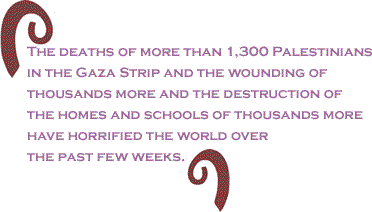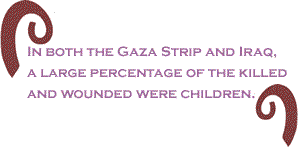
|
|||||||||||||||||||||||

Custom Search
|
|
 |
|
No one expects the Middle East to be easy to understand—what sets off one nation against another, one ethnic group against another, or one religious sect against another? The deaths of more than 1,300 Palestinians in the Gaza Strip and the wounding of thousands more and the destruction of the homes and schools of thousands more have horrified the world over the past few weeks. The Israeli losses are reported number about 20, mostly military. Bombings and missile strikes by one of the world’s most advanced military powers, and entry into the strip by Israeli tanks and infantry have produced the “shock and awe” effect that was produced when the American forces launched a war of choice—a war of aggression—against Saddam Hussein’s Iraq. That war, which is ongoing in an occupation that is unlikely to result in anything that resembles the western-style democracy that George W. Bush continued to insist was developing until the day he left office. “Shock and awe” is what the Bush Administration intended and that’s what the Iraqis got: by the end of the fourth year of an interminable war, there were some estimates that more than a million Iraqis had been killed outright or died from the destruction of their public services, and millions more had been forced to flee the country or were displaced in their own country. In both the Gaza Strip and Iraq, a large percentage of the killed and wounded were children. No one knows if the recent cease fire will hold in Gaza, and Iraq is in flux because of uncertainty about what President Barack Obama will do in conducting the wars in Afghanistan and Iraq. He spoke out against the war in Iraq before the U.S. went to war and said he would end that war. However, he promised to beef up the U.S. military presence in Afghanistan and concentrate on the growing influence of the Taliban and al Qaeda in that country.
In the lead-up to his inauguration this week, however, President Obama was not heard to speak out about the so-called war in Gaza, presumably because of his position that America only has one president at a time. Now that he is president, he must speak about the suffering in Gaza. He must speak about “proportionality” and what it means in international law and how the concept relates to both the Iraq War and the massive attacks on the Gaza Strip. There has been little discussion about proportionality in international relations, but it requires an objective view to determine what is proportional and what is not, in a response to an assault or an attack. On
a personal level, if someone punches another in the gut, the one
who is punched is not allowed to burn down the house of the puncher.
In international law and the understanding of proportionality on a global scale, a rational person would see that the invasion and occupation of Iraq was not proportional. The attacks of Sept.11, 2001, were attributed to people who were protected in Afghanistan, not Iraq. In fact, there was no rationale for attacking Iraq, except for the 26 ever-changing reasons the Bush Administration gave for the invasion. The suffering of the Iraqi people was seen in the U.S. largely through the eyes of the military, in which news reporters were “embedded,” and saw pretty much what the military overseers wanted them to see. Some exceptions were the news gathering operations of other nations. The full-scale assault on Iraq was against a nation that had been weakened by sanctions for 11 years and against a military that was largely incapable of response because vital parts of its defense apparatus had been destroyed or debilitated. “Shock and awe” was not proportional. In Gaza, said to be the most densely-populated area in the world, a million-and-a-half people had been living hand-to-mouth for years, depending on shipments of food, medical supplies, fuel, and all of the necessities of life from the outside. The nearly complete blockade of the strip by Israel had rendered it helpless, weak and, as described by many who visited the area, “an open-air prison.” It was on people living in that condition that Israel visited its own “shock and awe.” Superior Israeli weapons systems, military, and training have come from the largesse of the U.S., either through foreign aid or direct supply of defense systems and materiel. These were arrayed against people with rifles, mortars, and crude rockets. Hamas, which was elected by Palestinians in Gaza, constantly lobbed its rockets into Israel. Because of Hamas’s targeting of civilians, every rocket was an act of terrorism, but, in the scheme of things, there were few Israeli deaths or destruction of homes. The destruction in Gaza in recent weeks was not a proportional response to the rocket attacks. Like most things in international affairs, proportionality is in the eye of the beholder and many in Israel and the U.S.—particularly the U.S. Congress—have seen Israel’s devastating attack on Gaza to be justified, simply protection of its national borders and its people. Rarely do high-level officials of nations see the world from the perspective of someone on the ground, say, an Iraqi water plant worker or a Gaza farmer. These are the people who do the suffering and dying in times of war.
There are those in Israel, in its peace movement, who see both Israel’s and the Palestinians’ suffering and the world must listen to that movement. They know that only good-faith negotiation and diplomacy will bring peace to the Middle East. They urge their government to negotiate a settlement with the Palestinians, but this view is rarely covered by the American press. In their own country, Israeli peace advocates are given the same treatment American anti-Vietnam War activists received 35 years ago: “Our country. Love it or leave it!” During George Bush’s eight years in office, what the people thought or wanted mattered little to his administration, and the press picked up on that and marginalized the peace movement here. So it is with reporting on Israel’s substantial peace movement. If this black-out of news continues, that peace movement could wither away. Now that President Obama is in the White House, he needs to speak out about the war on the people of Gaza. He should be mindful of the rule of proportionality and should be willing to discuss it with the American people who are demanding peaceful settlements to wars that are draining us of our economic lifeblood. While the people might not know the fine details of the international law of proportionality, they know when an overwhelming force has fallen upon a helpless antagonist. They’ve seen it happen too often, especially in the past decade, and the polls and the people, themselves, tell us that they want it to end. BlackCommentator.com Columnist, John Funiciello, is a labor organizer and former union
organizer. His union work started when he became a local president
of The Newspaper Guild in the early 1970s. He was a reporter for
14 years for newspapers in |
|
Any BlackCommentator.com article may be re-printed so long as it is re-printed in its entirety and full credit given to the author and www.BlackCommentator.com. If the re-print is on the Internet we additionally request a link back to the original piece on our Website. Your comments are always welcome. eMail re-print notice
If you send us an eMail message we may publish all or part of it, unless you tell us it is not for publication. You may also request that we withhold your name. Thank you very much for your readership. |
|
| |
|


































